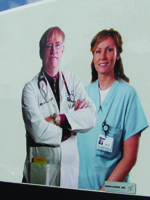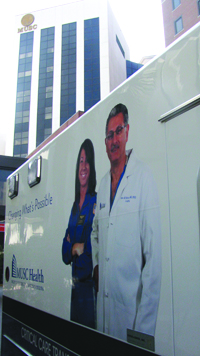|
By Dawn
Brazell
Public Relations
It's not every
day that you drive past yourself
on a vehicle. Douglas Norcross,
M.D., trauma surgeon in MUSC's
Department of Surgery, said it
shocked him the first time he saw
himself on an ambulance.
"It was very
strange. The first time I saw my
face on the vehicle, I was sitting
in traffic, and the thing pulled
up next to me. I looked over and
there I was, staring back at
myself. It bordered on a surreal
experience. The photographers did
a great job making me look good.
Not an easy task."
 Dr. Douglas
Norcross and Lisa Smith, PA-c,
as pictured on a Meducare
ambulance. Dr. Douglas
Norcross and Lisa Smith, PA-c,
as pictured on a Meducare
ambulance.
Norcross, who
has played an influential role in
MUSC's reputation as a
high-ranking Level 1 trauma
center, said MUSC's expertise and
experience in injury and emergency
care can't be matched by any other
institution in the area.
"First and
foremost, for people in the
coastal regions of South Carolina,
we are your trauma center
regardless of where you get care
for other problems. Like police,
fire, and EMS, the MUSC trauma
center is an important community
resource that benefits the entire
region."
Lynne M.
Barber, director of marketing
strategy, said the Meducare
helicopter and ambulance wraps are
an extension of the brand campaign
launched in August 2010. The
ambulances provide the opportunity
to continue promoting MUSC's
positioning statement, Changing
What's Possible, while featuring
employees who represent the brand,
she said.
"These
ambulances travel in many of our
target areas where we attract
patients. This strategy along with
advertising patient, student and
other constituents' experiences,
clinical expertise, great outcomes
and research advancements are what
help MUSC advance its brand."
Getting the
word out about MUSC's specialty
areas can help save lives, said W.
Scott Russell, medical director of
MUSC Pediatric Emergency Medicine.
He cites a recent report from the
Institute of Medicine that found
although children make nearly a
third of all emergency room
visits, a mere 6 percent of
hospitals have all the pediatric
supplies they need, only a quarter
of hospitals have access to
doctors board-certified in
pediatric emergency medicine, and
more than a third have no
pediatric specialists on call at
all.
 MUSC employees are
the focal point on ambulance
'wraps' that highlight the
influential role MUSC plays in
handling trauma cases. Above is
flight nurse Karen Ramsey and
Dr. Samir Fakhry. MUSC employees are
the focal point on ambulance
'wraps' that highlight the
influential role MUSC plays in
handling trauma cases. Above is
flight nurse Karen Ramsey and
Dr. Samir Fakhry.
That's not the
case at MUSC.
"We see over
20,000 pediatric cases a year. We
have all the resources to be a
Level 1 trauma center for
children. We have seven
board-certified pediatric
emergency medicine physicians, two
pediatricians, and two general
emergency medicine physicians who
work with us. We have three
pediatric emergency nurse
practitioners and are the only
hospital in the Lowcountry that
has access to all of the major
pediatric subspecialists," he
said, citing a long list of
specialty areas from neurosurgery
to orthopaedics.
"We are the
only hospital in the region that
can offer child life specialists
and pediatric sedation services."
Bruce Crookes, M.D., the trauma
program medical director for
adults, said MUSC has been a state
Level 1 since 1984. A Level 1
trauma designation is indicative
of the resources that MUSC has
available for the care of the
critically injured.
Level 1 trauma centers care for
the most severely injured patients
who have the most complex,
life-threatening injuries, 24
hours a day, seven days a week, he
said.
The MUSC trauma
program expects to become an
American College of Surgeons Level
1 trauma center, a mark of
distinction and dedication to
trauma care. This national
recognition is bestowed upon only
a handful of trauma centers across
the country.
Crookes said
they care for more than 2,100
adult trauma patients per year.
"Medical centers from across the
state send us their most complex
cases, as we have the expertise
and resources that enable us to
take care of these critically ill
patients. When benchmarked against
national mortality rates, our
trauma service has consistently
higher survival rates — a
testament to our dedication to our
patients."
Did you
know?
- MUSC admits
2,100 trauma patients per year.
MUSC has 1,100 trauma
activations annually.
- 43 percent
of patients suffered
traffic-related injuries, 26
percent were injured in a fall,
and 8 percent were injured by a
firearm.
- Trauma
surgeons are "in house" 24 hours
per day, 7 days a week.
- MUSC ranks
in the top 25 percent for the
number of severely injured
patients treated in its
comparison group of like-size
trauma centers.
- MUSC has a
comprehensive trauma research
program, including National
Institutes of Health-funded
studies and national
presentations and publications
that exceed the requirements for
ACS COT (American College of
Surgeons, Committee on Trauma)
Level 1 verification.
- MUSC has an
established alcohol screening
and intervention process for
trauma patients.
- The injury
prevention program has initiated
an Injury Prevention Campaign
for MUSC employees.
- MUSC
participates in the ACS Trauma
Quality Improvement Program, the
trauma equivalent to the
National Surgical Quality
Improvement Program.
- Trauma team
members are available to give
community talks on accident
prevention. Call
792-0473 for more information.
|



 Dr. Douglas
Norcross and Lisa Smith, PA-c,
as pictured on a Meducare
ambulance.
Dr. Douglas
Norcross and Lisa Smith, PA-c,
as pictured on a Meducare
ambulance. MUSC employees are
the focal point on ambulance
'wraps' that highlight the
influential role MUSC plays in
handling trauma cases. Above is
flight nurse Karen Ramsey and
Dr. Samir Fakhry.
MUSC employees are
the focal point on ambulance
'wraps' that highlight the
influential role MUSC plays in
handling trauma cases. Above is
flight nurse Karen Ramsey and
Dr. Samir Fakhry.